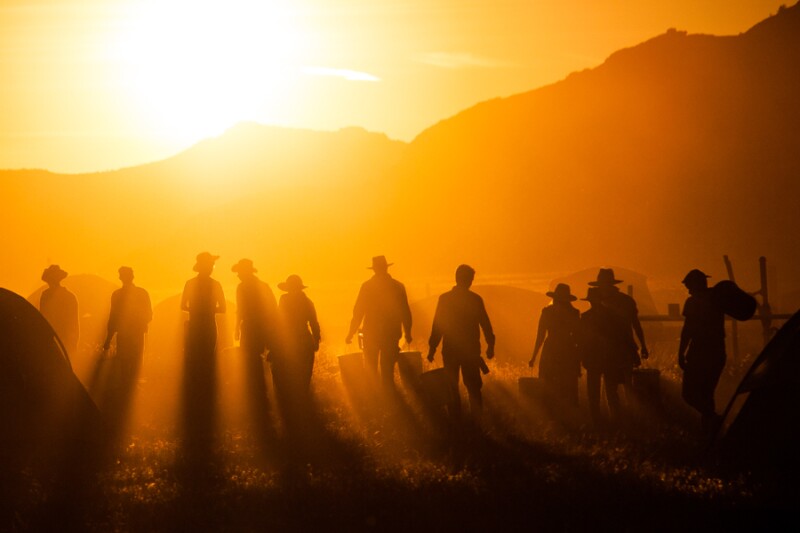What Happened to Most Families That Went West?
Until recently, my noesis of the westward expansion, the Western frontier, and pioneers mainly came from the popular Picayune House on the Prairie books and the pioneer computer game Oregon Trail. (I naively thought all pioneers died from dysentery out on the plains!) Beingness familiar with Usa history tin can really assist in your family history piece of work if you have pioneer ancestors. By looking at when your ancestors were built-in, if they moved, and where they moved, you can hands see if your family had any pioneers involved in settling the great Western frontier.Westward expansion picked upward speed in 1803 with President Thomas Jefferson and the purchase of the Louisiana Territory from French republic. With $15 million, Jefferson doubled the corporeality of land in the United States. He and so commissioned Meriwether Lewis and William Clark to map the newly purchased land and discover a mode to the Pacific Ocean.All-encompassing expansion into the Western borderland did non become far, notwithstanding, until around the 1840s when the idea of Manifest Destiny took a strong hold on the American psyche. The Homestead Act also played a large part in later years.
Manifest Destiny
The term Manifest Destiny was first coined by newspaper editor John L. O'Sullivan, although the attitude had already been present in the American mind. Manifest Destiny is the idea that it was the destiny of the United States to spread from the Atlantic to the Pacific Ocean. United States lawmakers, enamored with this idea, helped extend the railroad and created incentives to send people west.

In 1846, President James G. Polk, a supporter of Manifest Destiny, reached a compromise with Uk on the Oregon Territory, making the 49th parallel the boundary betwixt Canada and the United States.Presently later, at the end of the Mexican–American State of war and the Treaty of Guadalupe, the States gained more than 525,000 foursquare miles of land that would afterward become Arizona, California, Colorado, Nevada, New United mexican states, Texas, and Utah.Westward expansion would ultimately involve more than seven million pioneers living in the Trans-Appalachian West and the addition of 22 new states. A timeline of the early history of the U.s.a. tin can assist you lot empathise what events your ancestors might have been part of in early and tardily w expansion.
Why Did the Pioneers Move West?

The news of open up land reached the ears of immigrants, freed slaves, farmers, single women, and others. For many, life in the eastern states had lost its entreatment. Some had trouble finding a job, overcrowding started beingness an issue in certain areas, and farmers wanted more state to subcontract. Others just didn't similar living in what was becoming an industry-driven country with big cities. Still others moved west to escape persecution. Many people living in modern-twenty-four hours Utah and surrounding areas had pioneers in their family move west with Brigham Young and the Mormon pioneers starting in 1846.In 1848, the California Gilt Blitz began. The gold rush attracted opportunists, miners, and businessmen. It also brought much needed goods to the West and created small-scale mining towns. Pioneers came on several routes, the virtually mutual existence the California and Oregon Trails.Texas ranches provided work for cowboys and ranchers. In later years, free-range cattle would be rounded up and fenced in. With less cattle roaming the open land, space was made for even more pioneers to settle on.The regime besides provided incentives such equally the Homestead Deed for people to move west into the newly acquired territory.
The Homestead Act of 1862
In 1862, the Homestead Act was created. It allowed pioneers to claim 160 acres of gratuitous land. This offering went to anyone who was listed as caput of the household or who was at least 21 years of age. This human activity provided a peachy opportunity for people who looked to build a new life. The principal requirement for making a claim was that claimants stayed on the land for five years and made various improvements, such as building a business firm. The merely coin spent was an $18 filing fee.

To file for a merits, a homesteader would take the survey coordinates to the nearest land role. Checks would be made to ensure that the country was not already claimed, and the homesteader would concur to build a house and farm, which were required for ownership to be finalized. Later, 2 neighbors would sign statements saying the requirements had been met. The landowner would then become a patent for the land signed by the president of the United States.Homestead records are a great way to detect information about where your ancestors lived and when they lived there. FamilySearch has a large database for finding patents and deeds.
Finding Pioneers in Your Family
With the thousands of pioneers who settled the Western borderland, it is very probable that yous had an ancestor involved. Pioneer record collections that are freely available on FamilySearch are a dandy place to begin exploring your pioneer heritage:
|
|
|
Pioneer records tin be hard to track downwardly, as there weren't "pioneer registers" persay that existed during the western expansion. These wiki pages tin can point y'all to other significant pioneer record collections (though not all of them are freely accessible):
- Oregon Trail Settlers and Records
- California Trail Settlers and Records
- Mormon Trail Settlers and Records
If you already have a FamilySearch Family Tree, finding relatives who went west is fifty-fifty easier. Detect your ancestors' unique stories with this interactive FamilySearch pioneer tool.
Source: https://www.familysearch.org/en/blog/westward-expansion-pioneers
0 Response to "What Happened to Most Families That Went West?"
Post a Comment